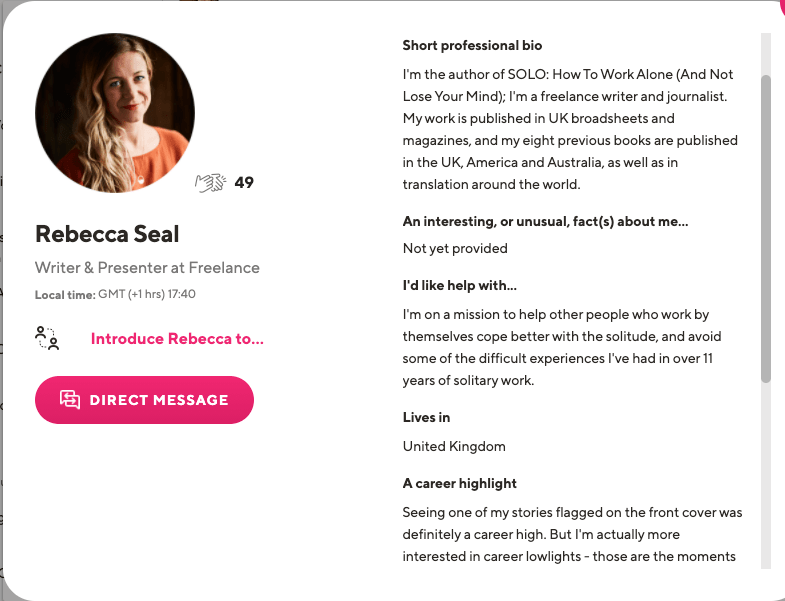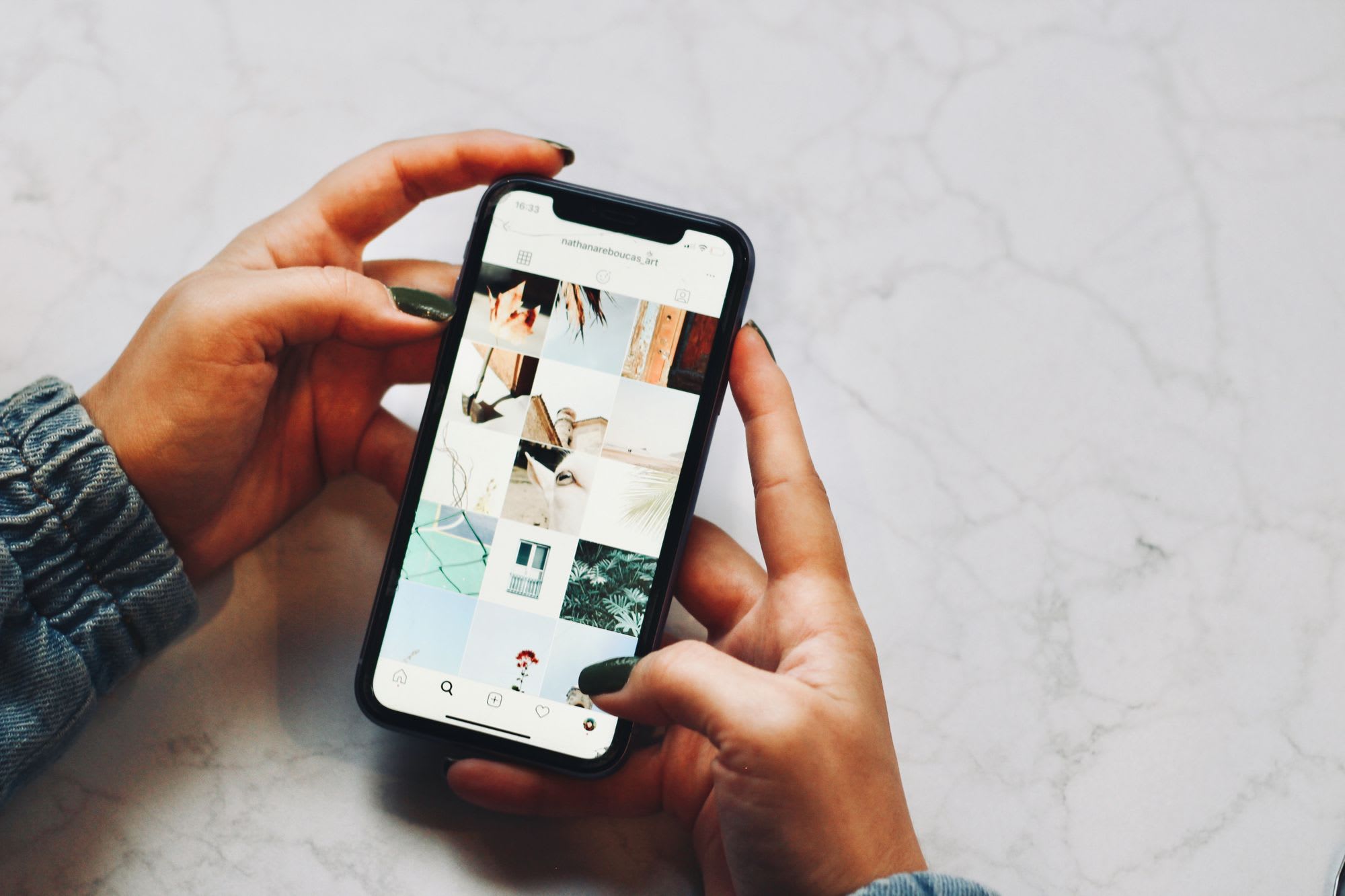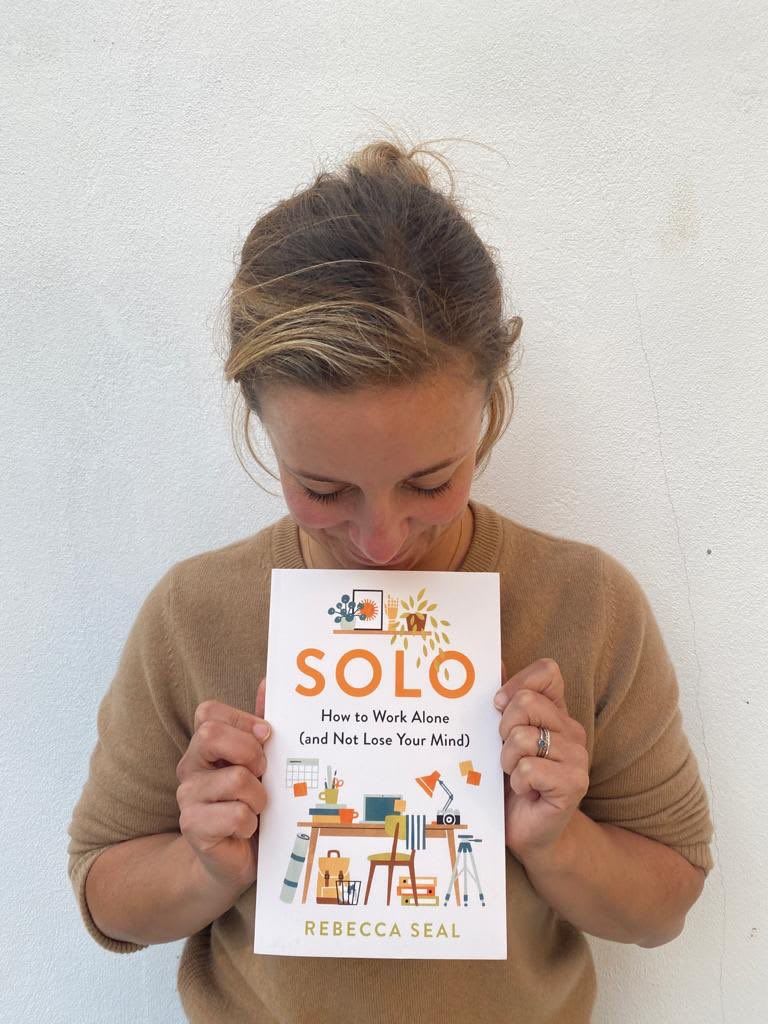Rebecca Seal, is an award-winning food, drink, lifestyle and personal development writer, based in London.
She also consults with businesses on remote working.

Rebecca's latest book, ‘SOLO: How To Work Alone (And Not Lose Your Mind)' was written before Covid-19 and millions of people having to adapt to remote working.
SOLO is a brilliant guide to adapting psychologically to remote working.
A number of themes explored in the book, for example emotional resilience, the importance of support networks, coping with loneliness, finding meaning in work, separating home life and rituals resonated with our FORT (Furloughed or Released Talent) group job seekers and those who had returned to work.
Job hunting can feel like having a full time job. It requires discipline and focus. Some people who have been furloughed or released from jobs have shared the psychological impact from feeling cut off from the office and how hard it can be to focus without distraction.
Rebecca shared some helpful advice and tips for both remote workers and remote job seekers in our latest AMA:
Hi Rebecca! Is an author's life as glamorous as many of us imagine?
"It is very occasionally - extremely occasionally at the moment!
But mostly it involves sitting by yourself staring at a screen, like many jobs. And when I write cookbooks, which I love doing, there are vast quantities of washing up. I don't think the reality is much like the idea of it!
If you'd like a window on how not-glamorous my life is, I am shortly off to clean the photography studio I run with my husband."
Have you always worked remotely?
"No, I spent six years at the Observer, as an Assistant Editor, before going freelance 11 years ago. Before that I worked at the Evening Stand for a short time. And I managed restaurants before that, which is the direct opposite of solo work."
How can we deal with distractions and stay focused when working from home?
"Distractions are really hard. One way to get around them is to create transitional rituals which allow you to help your brain move from one mode (home) into work.
It's what the commute used to do for many of us, but without it, a lot of new 'working from home-ers' struggle to shift between the 2 modes. Transitional rituals can be anything - going for a walk, a particular radio show or even your finishing your second cup of coffee.
For me it's about getting dressed properly and wearing make up. Also if Woman's Hour is on, I know I'm late to start my day! Obviously this is tightly connected to routine. But basically if I'm dressed for work, I'm less likely to get distracted and start doing laundry.
Can we really be fully productive when there are so many distractions on our mobile phones?
"Tech allows us some great opportunities but think of it this way: every interruption we have takes up to 20 minutes to recover from in terms of focus. And we interrupt ourselves, with our phones, sometimes hundreds of times a day. So arguably we never focus at all. Which might explain why everyone, including me, is desperate for productivity hacks. When the real one is just: put your phone in a drawer.
I've got a section on this in the book. Human brains were not terribly well equipped to deal with the information they received in the pre digital era. Now, we are bombarded with information bits, and we just can't handle it."

What are the biggest challenges when working from home?
"I think there are two things which are important. Not necessarily challenges - but crucial things to think about.
The first is that we have to remember that we are NOT our jobs. We DO our jobs, but we are not our jobs. And when we WFH it's really hard to remember that because the work can bleed into areas where it really has no business being.
And that leads to the 2nd thing which is boundary setting.
We all need to have times and places where our work can exist, and times and places (bed, mealtimes, rest times, exercise time, evenings, weekends) where it absolutely isn't allowed.
Think of it like this. When you work by yourself you are - even if you have a boss - your own boss, to a certain extent. How horrible of a boss do you want to be of yourself?
If your actual boss told you to check your emails the second you woke up, during dinner, during childcare and in the bath, would you do it? Would you accept that kind of draconian treatment?"
Do you have to have a particular set up for working from home. So many people work at the kitchen table?
"I was at the kitchen table recently, for a couple of years and I hated it. But the one thing which really helped was sweeping everything into a cupboard every night. It was a pain but absolutely essential for well being.
Is it's possible, get a roll top desk and have it in a corner, so you can at least shut it? Or if not, get a 'work box' - which could be something really attractive - where all the work stuff could be hidden away at the end of the day.
Anything to allow the kitchen table to be the kitchen table again for you is a positive thing."
Do you think employers should provide proper chairs and screens to remote workers?
"YES! I've been talking to a number of businesses about exactly this.
There is going to be an epidemic (no pun intended) of RSI, back injuries, carpal tunnel - not to mention depression and burn out.
Laptops are not designed to be worked on all day. The screens and key boards are too small. Companies should be providing remote staff with all the right gear.
More than that, if at all possible, we should be getting this stuff for ourselves, if we don't have a company to buy it for us. A laptop stand to bring the screen to eye level, a wireless keyboard and mouse and a desk chair can be got for under £200. And £200 is a lot less than 6 sessions of physio."
Full time job seeking can be harder than a full time job. There are exactly the same remote working challenges. Do you have any tips separating work life (and job seeking life) from home life?
"Job seeking is very hard. And I speak as a freelancer who has to job seek a lot!
Try and find a physical space where work/job seeking is done, and when the work is finished, do something to signal to yourself that it's over. By which I mean, don't look for jobs while watching TV on the sofa.
Create time to do the task, somewhere specific, and when it's done, do something symbolic to show it's done. That could be throwing a sheet over the desk, or if you're at the kitchen table shoving it all into a cupboard or even a box, hiding it from your brain and allowing you to distance yourself from it."
Do you have to have a healthy relationship with technology?
"My relationship with tech is one that require ongoing work! I have a terrible phone addiction which I am working on. Really working on!
I'm much better in terms of shutting down screens for the evening, otherwise it's terrible for your brain's ability to wind down for sleep - the blue light is awful. And I am instituting set times for email. I know ALL the science of how our brains are hijacked by tech, and I'm still a victim of it.
If you can put your phone out of sight and far from your hand's reach, it really helps. When I'm writing I put mine in a drawer so it's little shiny face can't tempt me. I did have all those screen limiting things in place, but I just found myself circumventing them.
Smart phones are a very double edged sword for home workers. They have been deliberately designed to addict us, in the real sense. I think we need to change our mindsets - we see them as helpers (which they are), but they are much darker than just that."
Are there themes in your book SOLO that can apply to job seekers as much to those working from home?
"Yes for sure - SOLO is all about finding resilience, getting to know yourself really well so you can construct a working life that really, really suits you, it's about the curse of long hours culture and how to separate your identity from your job.
And I think those things are more relevant to those of us seeking work, perhaps, than people in work. There's a technique called job crafting which I go into, and how to think about what meaningful work might be specifically for you."

Do you look at Mindfulness techniques in your book?
"The data is so strong for mindfulness and meditation in terms of concentration and productivity that I couldn't ignore it. I actually use meditation (erratically) as a way to calm down and deal with anxiety.
I sometimes think that trying to force ourselves into a daily practice just creates more stress and if it doesn't come naturally, it doesn't feel all that kind to ourselves.
The book as a whole is certainly about being kind to oneself - really because we need to get to know ourselves and our needs and our capacities, and work with that knowledge - rather than against it.
For example, that could mean knowing you are an owl (me) and it is pointless trying to start work before 10am. Yet for 10 years I berated myself every morning for not starting sooner, until I discovered that that will never be me. Only by knowing who we are and what we need, can we be kind to ourselves."
Thank you to Rebecca for joining us in the FORT.
Other FORT AMAs:
Inside the FORT - Three comms recruitment leaders discuss their top CV and job application tips
Inside the FORT with BoldMove founder Julia Fenwick - Prospects for the communications industry post-COVID
Inside the FORT with journalist and writer Linda Aitchison: How jobseekers can stand out on LinkedIn
Inside the FORT with The PR Cavalry’s Nigel Sarbutts – Making the leap to freelancing
Are you furloughed or looking for new job opportunities in marketing, comms, creative or digital?
If you have been furloughed or released, or know someone who has and might benefit from joining FORT download Guild from an app store and click on this link. [strictly no recruitment consultants please]
You'll be made to feel very welcome by the community.
Join Guild 🤝
See for yourself how the Guild experience is different to WhatsApp, Slack, LinkedIn or Facebook Groups. Guild is a safe space to connect, communicate and collaborate with others.
Join us on a platform that is purpose-built for professionals and businesses.
- Just want to join some groups? Simply join Guild and then look through the discoverable groups and communities to find relevant ones to join
- Thinking of running your own community? With an elegant and simple to use, mobile-first UX you’ve got everything you need to start a community - custom branding, analytics, group and user management and support. Get started with your own community here with our free and enterprise options
Contact us if you want to know more or have any questions.